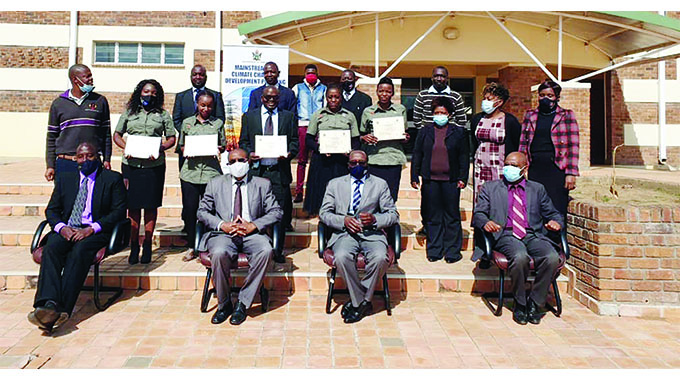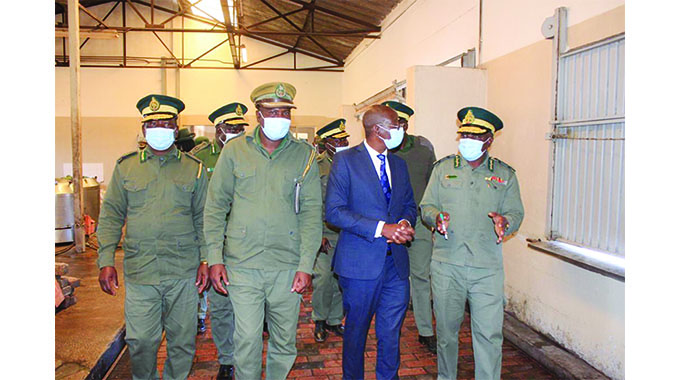Varsities conclude ground breaking climate change research

Michelle Nyanzira, Chronicle Reporter
Government has unveiled a US$150 000 grant to enhance scholarly research into climate change at State universities.
The major step in dealing with the devastating effects of the ever-changing climatic patterns is being integrated into the devolution agenda.
The effects of climate change in Zimbabwe are evident in the wake of unpredictable weather that has had an effect on biodiversity and agricultural activity. Government, through its climate change mitigation programme that is drawn up in the National Development Strategy-1, engaged seven state varsities to conduct a research on mainstreaming climate change on development.
Under the grant agreement, seven participating universities were offered training and undertook conventional research to Provincial Development Committees (PDCs) as a tool for analysing impacts and supporting innovations to upscale climate change national adaptation strategies.
This was initiated under the National Adaptation Plan (NAP), a process that helps countries to conduct a comprehensive, medium and long-term climate adaptation planning.
In March the Ministry of Environment, Climate, Tourism and Hospitality Industry, signed agreements with seven universities; the National University of Science and Technology, University of Zimbabwe, Lupane State University, Midlands State University, Great Zimbabwe, Bindura University and Chinhoyi University to ground break the study.
The research presentation also coincided with the award certification of the researchers, in events held at the LSU and Nust campuses this week.
In a speech, the Director for Climate Change Management Department Mr Washington Zhakata said the research was of importance to national development.
He said climate change mainstreaming and a solid adaptation plan are key in the success of national projects.
“We realised that we need a process which will start infusing climate change mainstreaming it as it were, in all our processes including the national budgeting process and now that we talking of devolution it also becomes relevant even for project selection, at provincial level and prioritisation of those projects as well,” he said.
He said this programme is premised on the need to become a climate resilient and low carbon economy by 2030.
Speaking at the event to present findings of a research on climate change mainstreaming programme done by LSU, the university’s Vice Chancellor Professor Kusaziva Kuipa, said the impact of climate change on human and wildlife cannot be overemphasised and the research was envisaged to inform on the mitigation and adaptation strategies that the Ministry of Environment has to implement.
“We are greatly honoured to be partnering with the Ministry, alongside six other local universities in facilitating the mainstreaming of climate change in development planning in our nation. As Lupane State University we cherish the opportunity to participate in the implementation of the Climate Change Mainstreaming Research Programme,” said Prof Kuipa.
Prof Kuipa said the climate change investigation was a team effort that also involved members of the community.
“The involvement of Provincial Development Committee (PDC) members in rolling out the climate change mainstreaming programme will also ensure ownership at grassroots level as these members are part of the local communities,” he said.
“The training that the PDC members have gone through is part of the capacity building interventions that will ensure the effectiveness of the implementation process.
“Our lecturers and students are available to actively participate in the implementation of the climate change mainstreaming programme through participation in research and other interventions that the Ministry will spearhead in collaboration with the PDC members and local communities. Climate Change mitigation and adaptation strategies anchored on research are envisaged to capacitate our local communities to improve their livelihoods and enhance sustainability.”
Prof Kuipa heaped praise on two university staffers whom he said played a key role in the research.
“My sincere gratitude goes to our climate change experts, Dr Keith Phiri and Dr Sethi Sibanda, who have been actively involved in this programme, attending training of trainers’ workshops and facilitating the training of our PDC members.
“It is my sincere hope and expectation that this climate change mainstreaming programme will go a long way in transforming the way climate change will be taught within the University, availing abundant opportunities for applied research that will inform policy direction, and improving the sustainability of livelihoods through research-anchored mitigation and adaptation strategies,” he said.
Nust Pro Vice Chancellor for Research and Academic Affairs, Prof Yogi Naki said it was the duty of tertiary education institutions to spearhead knowledge about climate change.
“Our research must offer solutions, because the nation needs solutions. I therefore challenge development stakeholders to take up the research output and let it inform the way forward,” he said.
Three months ago, Great Zimbabwe University Vice Chancellor, Prof Rungano Zvobgo said it is the role of tertiary institutions to enhance the development of the country through participating in such programmes.
“I believe that this climate change project after we saw what happened in Manicaland, it should help our people live better. We really have been tasked by the Government to do an honorous job to make sure that we transform the lives of our people,” he said.-@michieroxy











Comments